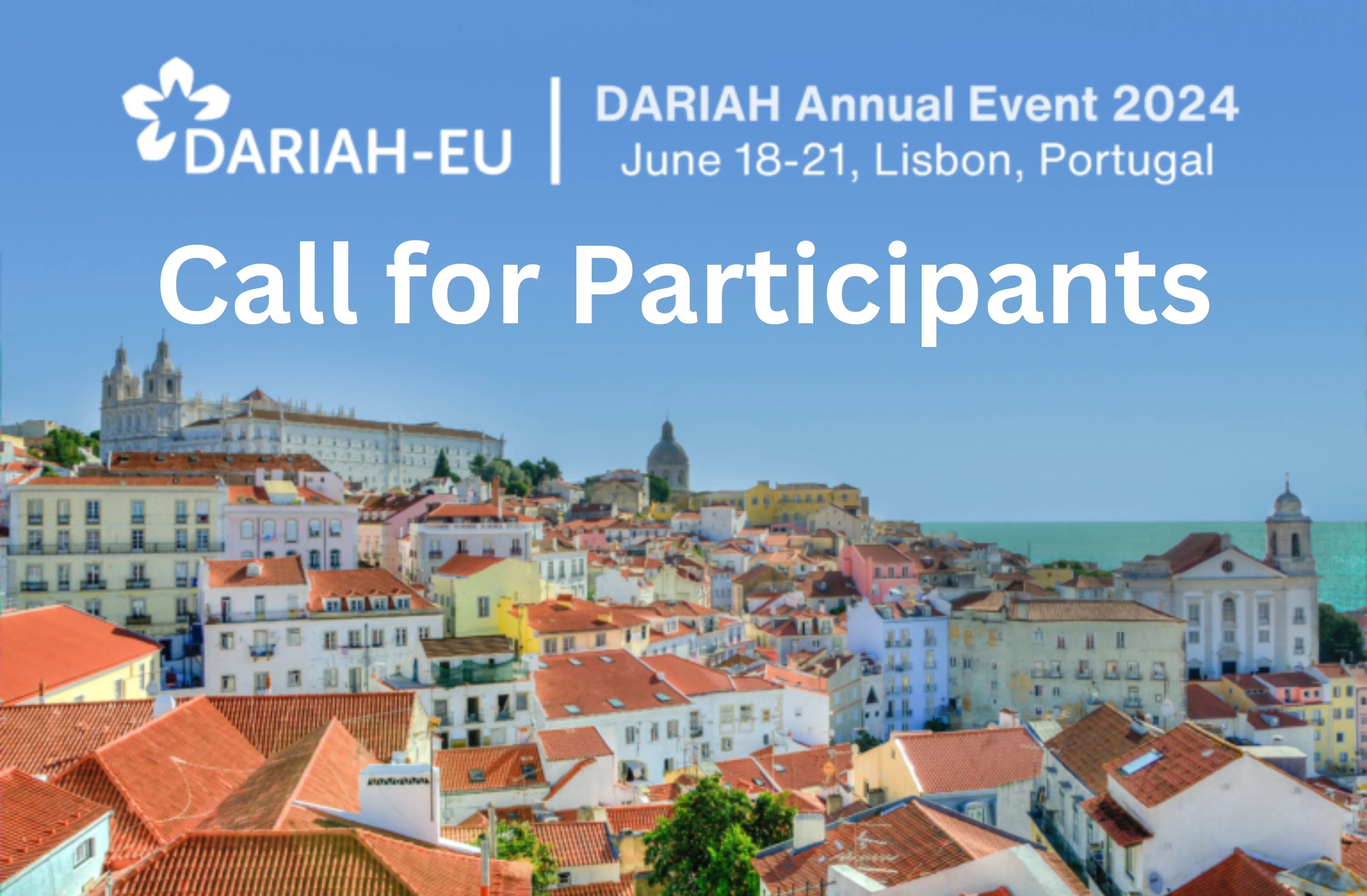
Call for Participants: DARIAH Annual Event 2024
Workflows: Digital Methods for Reproducible Research Practices in the Arts and Humanities
Lisbon, Portugal, June 18-21, 2024 (in-person conference)
Building on the topic of last year’s Theme Call, the DARIAH Annual Event 2024 will be dedicated to the topic of Workflows: Digital Methods for Reproducible Research Practices in the Arts and Humanities. DARIAH EU is looking for contributions that explore, assess, analyse and embody the challenges of designing, implementing, documenting and sharing digitally-enabled workflows in the context of arts and humanities research from a technical, methodological, infrastructural and conceptual point of view.
Accepted submissions are expected to be presented in-person in Lisbon, Portugal.
Questions that DARIAH EU would like to see addressed include but are not limited to:
- what is the state of the art in research workflows in the digital arts and humanities?
- What are we doing well, and what should we do better?
- How can we evaluate the appropriateness of a workflow or assess its efficiency?
- What makes a workflow innovative?
- Are there differences in the way we define and implement workflows in different scholarly domains?
- What is the role of interdisciplinarity: how can collaborations between experts from different disciplines (arts, humanities, technology etc.) lead to innovative perspectives and more comprehensive solutions to specific challenges?
- What does it mean for a workflow to be ethical, reproducible and sustainable?
- What kind of documentation is necessary and at what level of granularity?
- Are there modelling, standardisation or data management frameworks that make the documentation of workflows easier?
- What is the role of training and education in preserving and communicating workflows?
- How do we — both institutionally and conceptually — become better aware of the tacit knowledge and hidden costs which seem to be embedded in most of our day-to-day professional activities?
- To what extent is the increasing use of artificial intelligence (AI) affecting our research workflows?
- What will be the role of responsible, human-centric AI in the future of research workflows?
- Finally, what should DARIAH do — in addition to treating workflows as a particular content type on the SSH Open Marketplace — to help researchers develop, deploy and disseminate workflows that contribute to the interoperability of data, tools and services?
All accepted papers will be part of thematic sessions, chaired by a member of the Programme Committee. The DARIAH Annual Event combines different forms of encounter and exchange between DARIAH researchers and the wider cultural heritage, arts and humanities, as well as computer, information and data science communities.
The call for participation accepts:
- Papers
- Panels
- Posters and Demos
For all contributions, a title and an abstract are to be submitted via the Submission page. Accepted submissions will be published in the Book of Abstracts on Zenodo.
Submission will be open from December 6, 2023 until February 4, 2024.
Please note that each submission will be reviewed by at least two members of the Programme Committee using open identities.
Notification of acceptance is expected by March 25, 2024.
Types of Proposals
Paper submissions should include a title, the names of the authors and a 500-word abstract. In ConfTool, please provide the abstract text in the corresponding field; please also upload a pdf with the abstract, references and (possibly) images (500 words max, excluding references). DARIAH EU expects papers to be in the range of 15-20 min.
Panel submissions should include a general title and a list of contributions that make up the panel, the names of the authors for each contribution and a 750-word abstract for the whole panel. In ConfTool, please also upload a pdf with the abstract, references and (possibly) images (750 words max, excluding references). The total duration of the panel session is 90 minutes. DARIAH EU encourages the authors of this submission type to include moments of exchange with the audience, and would like this to be an interactive session, as much as allowed by the time and format.
DARIAH EU is looking for original posters and demos related to the topic of this year’s event. This category typically includes state-of-the-art project reports, work in progress, beta-versions of tools or new releases of existing tools and services. Demonstration interfaces, online prototypes and experimental work with data at the intersection of cultural heritage and the arts and humanities are welcome. Submissions should include a title, the names of the authors and a 500-word abstract. In ConfTool, please also upload a pdf with the abstract, references and (possibly) images (500 words max, excluding references).
Evaluation of proposals
Each submission will be reviewed by at least two reviewers selected among the Programme Committee and other DARIAH bodies (DARIAH Joint Research Committee, DARIAH National Coordinator Committee, DARIAH Coordination Office, DARIAH Strategic Management Team). The reviewers are chosen by the PC according to their expertise in the digital arts and humanities and digital cultural heritage.
The proposals will be reviewed against the following criteria:
- Relevance to the event’s topic
- Relevance to the DARIAH’s community
- Originality, innovation
- Structure and clarity
More information can be found on the DARIAH EU website .